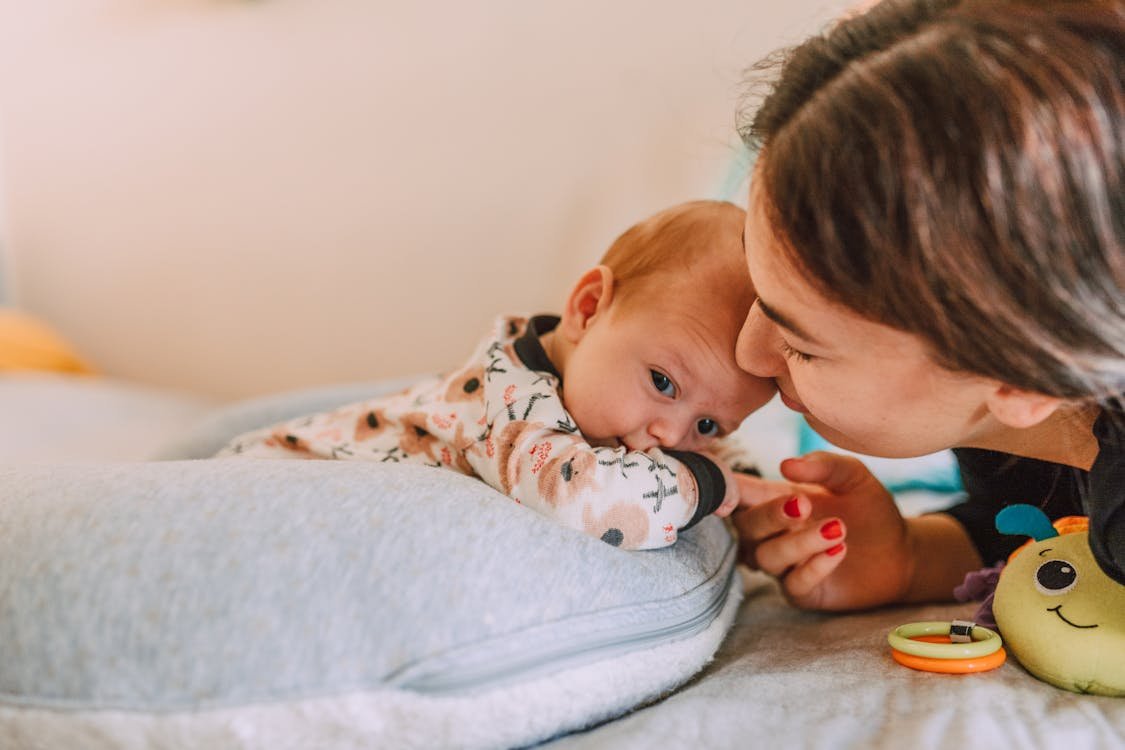Deciding when to start sleep training is a significant milestone for many parents, often filled with questions and a touch of apprehension. You want what’s best for your baby’s sleep and your family’s well-being, but timing is crucial. Is there a “magic age”? What signs indicate your baby is truly ready? This guide will help you navigate these important considerations, so you can feel confident about choosing the right time to begin this journey. As always, we recommend discussing any sleep training plans with your pediatrician first.
Is There a “Perfect” Age to Start Sleep Training?
While there’s no single “perfect” age that suits every baby, most experts and pediatric organizations suggest that babies are generally developmentally ready for more formal sleep training methods between 4 to 6 months of age. Here’s why:
- Self-Soothing Capabilities: Around this age, many babies begin to develop the ability to self-soothe, a key skill for independent sleep.
- Reduced Night Feedings: By 4-6 months, many healthy, full-term babies no longer physiologically need multiple night feeds for nutrition (though some may still wake for comfort or habit). Your pediatrician can advise on your specific baby’s needs.
- Sleep Cycles Maturing: Their sleep cycles start to mature, resembling adult patterns more closely.
However, age is just one piece of the puzzle. Observing your baby for signs of readiness is equally, if not more, important.
Key Signs Your Baby Might Be Ready for Sleep Training:
Look for these indicators when considering when to start sleep training:
- Consistent Night Wakings (Not Due to Hunger): If your baby is older than 4-6 months and still waking frequently throughout the night, and you’ve ruled out hunger or discomfort, they might be relying on sleep associations (like rocking or feeding) to fall back asleep.
- Difficulty Falling Asleep Independently: Does your baby need extensive help from you to fall asleep at bedtime (e.g., being held, rocked, or fed until fully asleep)?
- Short Naps or Resisting Naps: While nap training can be different, consistent difficulty with naps can sometimes indicate a readiness for learning independent sleep skills.
- Showing Some Self-Soothing Attempts: Have you noticed your baby trying to soothe themselves, perhaps by sucking on their fingers or a dummy, or humming? These are positive signs.
- Good General Health: Ensure your baby is healthy and not currently dealing with illness, significant teething pain, or a major developmental leap that’s causing unusual fussiness.
- Meeting Developmental Milestones: Generally, being able to roll over is a good indicator, as swaddling (a common newborn sleep aid) needs to stop once they can roll.
When Not to Start Sleep Training (Or When to Pause):
Timing is everything. It’s generally advisable to postpone or pause sleep training if:
- Your Baby is Unwell: A sick baby needs comfort and care, not the added stress of sleep training.
- You’re Travelling or Have Major Disruptions: Consistency is vital. Starting sleep training during a holiday or when your routine is significantly disrupted is unlikely to be successful.
- Major Life Changes: Events like moving house, starting nursery, or the arrival of a new sibling can be unsettling. Allow your baby to adjust before introducing sleep training.
- Significant Teething Pain: While mild teething can often be managed, if your baby is in acute pain, it’s best to wait.
- You (the Parent) Are Not Ready: Sleep training requires commitment and emotional resilience. If you’re feeling overwhelmed or unsure, it’s okay to wait until you feel more prepared.
Parental Readiness: Are You Ready?
This is a crucial, often overlooked, aspect of when to start sleep training. Ask yourselves:
- Are all caregivers on board and committed to being consistent?
- Are you emotionally prepared for some potential crying or protest from your baby?
- Can you commit to the chosen method consistently for at least 1-2 weeks?
Being aligned and prepared as parents will significantly increase your chances of success.
Conclusion:
Deciding when to start sleep training is a personal choice for each family, guided by your baby’s individual development and your family’s circumstances. While the 4-6 month mark is a common guideline, look for those crucial signs of readiness in your baby and ensure you feel prepared as parents. Trust your instincts, consult your pediatrician, and remember that the goal is to gently guide your child towards healthy, independent sleep habits.
Once you’ve decided it’s the right time, you might wonder how long the process will take. Explore our guide on How Long Does Sleep Training Take? for realistic timelines.
What did you think of this post? Leave a comment below and share your own bedtime routine tips!

